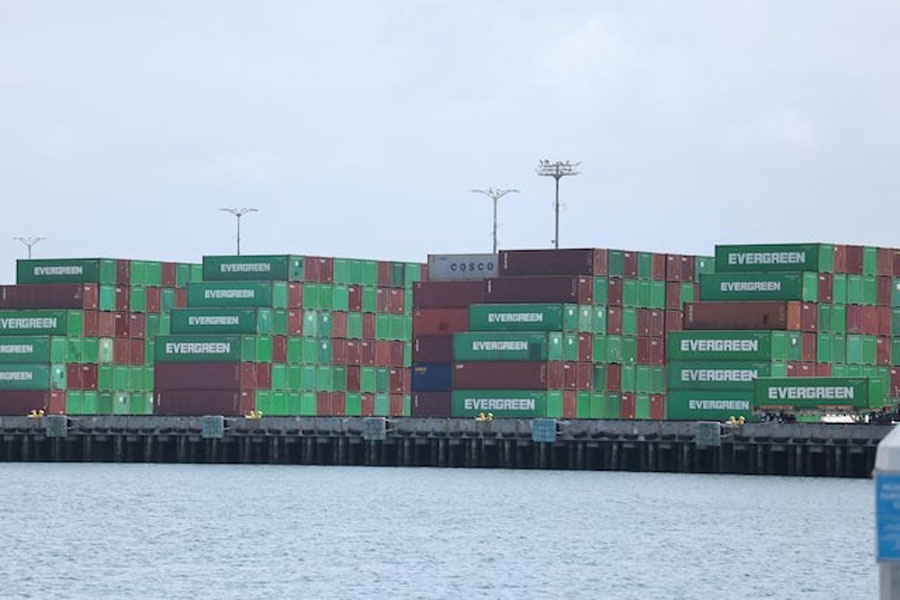
Published :
Updated :

US importers are increasingly relying on customs brokers to keep up with President Donald Trump’s ever-changing trade policies. But booming demand for help in processing foreign goods has made these services more expensive, adding another cost to the tariff burden, industry players told Reuters.
Customs brokerages, until recently an anonymous branch of the import ecosystem, handle the paperwork needed to process shipments and calculate tariff bills. Mom-and-pop brokers interviewed by Reuters say they are raising fees, while major logistics firms like Memphis, Tennessee-based FedEx (FDX.N) and Germany-based DHL (DHLn.DE) are also adding staff to their customs compliance teams.
Market research firms ballpark customs brokering as a roughly $5 billion industry in the United States. Hiring a broker is optional, but the increasing complexities of US tariffs and customs regulations are leading more importers to shell out the cash.
Independent brokers like Laredo, Texas-based JD Gonzalez are fielding dozens of questions daily from concerned clients struggling to understand what they may owe to US Customs and Border Protection, and whether to go ahead with shipments or hold off.
Brokers are also spending more time and labor on customs forms than ever, and have in some cases implemented new IT systems.
“With all the new information we have to process, some of the automation we've used has been thrown out, so there’s more work to do,” said JD Gonzalez, who is also president of custom brokerage trade group NCBFAA.
The trend is part of a broader wave of corporate efforts to bolster trade compliance operations. Major companies, from Nike (NKE.N) to Amazon (AMZN.O) to Lowe’s (LOW.N) had published job postings as of Wednesday for trade and customs professionals.
Nike was seeking a “lead” for trade and customs, who would “play a pivotal role in shaping the future of our trade compliance framework,” according to the post on Nike’s careers website. Amazon, meanwhile, had at least 10 US customs brokerage jobs listed on its careers website. Lowe's had three.
Nike, Amazon and Lowe’s did not respond to requests for comment.
HIGHER FEES
Independent brokers often base their fees on the number of codes they must enter to classify the contents of a given shipment. Known as harmonized tariff schedule codes, these line items help border officials distinguish car parts from children's toys, and determine proper tariff rates.
Prior to Trump's frenetic tariff policies, fees ranged from around $4 to $7 per code. But Gonzalez said the extra costs brokers have incurred as they ramp up systems to handle the tariff changes have led some to increase fees by $1 to $5 per code.
Gonzalez said he has raised fees “nominally,” while Steve Bozicevic, CEO of A&A Customs Brokers headquartered in Seattle and Vancouver, said his company added $3 per product type being imported into the US because of merchandise facing "tariff stacking," a phrase used when an item faces multiple tariffs.
"We raised the rates for the US because of the new and added complexity," Bozicevic said. The company has not raised rates for imports into Canada because there's "no new complexity," he said.
United Parcel Service (UPS.N) raised brokerage rates in December between $3.75 and $50 per import entry, depending on the country of origin. The move was part of general rate increases and unrelated to changes in tariffs, a UPS spokesperson told Reuters. FedEx's logistics arm increased its base customs brokerage rates by 4 per cent in January, according to a company spokesperson.
These bigger logistics companies, which include brokerage services in their broader shipping offerings, are also beefing up staff. DHL has upped headcount on its US customs entry team by 30 per cent since February, according to a spokesperson for the company’s DHL Express shipping unit.
FedEx had more than 40 open job postings on its customs and trade teams as of Tuesday, mainly based in the US, according to its LinkedIn jobs page. UPS had 10 similar US positions open, according to its jobs website.
FedEx is "adjusting our network to meet demand" in an evolving tariff landscape, which "includes hiring additional customs brokerage roles," the spokesperson said. UPS declined to comment on the job postings.
Historically, tariff changes have been less frequent, say brokers, trade lawyers and other trade professionals, and they have come with weeks of lead time, allowing brokers to prepare for the change and provide logistical feedback to CBP.
Compare that to last week's doubling of steel and aluminum tariffs to 50 per cent, which Trump announced abruptly, forcing the US customs department to quickly publish official guidance just hours ahead of a midnight change.
"Many brokers clear shipments ahead of time, so then you have to come back and retroactively redo it and fix it," said Miami-based customs broker Ralph De La Rosa, whose company, Imperial Freight Brokers, was founded by his father 54 years ago.
Even brokers who have not raised fees said their services have become inherently more expensive as the number of HTS codes has spiked.
Importers slowed shipments into the United States after Trump’s massive tariff announcement on April 2, after having frontloaded purchases earlier in the year to get ahead of an expected rise in duties.
Imports of consumer goods, which include cell phones and other household items, decreased $68.9 billion to $277.9 billion in April from a month before, according to the US Bureau of Economic Analysis. Trump announced additional tariffs on steel and aluminum in June and in May threatened to impose 50 per cent tariffs on the European Union.
Adding to the uncertainty, a federal appellate court on Tuesday ruled that sweeping tariffs may remain in effect while appeals proceed, after a trade court ruled that the US president overstepped his executive powers and blocked the duties. The appellate scheduled arguments for July 31.


 For all latest news, follow The Financial Express Google News channel.
For all latest news, follow The Financial Express Google News channel.